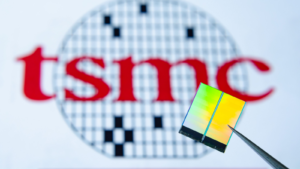
Let’s take a look at three mega-cap stocks to own. A mega-cap company is traditionally thought of as a firm with a market capitalization of at least $200 billion. These are the true giants of the American economic system.
As of this writing, there are just 47 stocks listed on the New York Stock Exchange or Nasdaq with a market capitalization that qualifies for mega-cap status.
Generally speaking, companies that reach this size have gotten there through a fantastic product or business model. Oftentimes, however, a company already becomes quite mature by the time it gets large enough to stack up such a prodigious market capitalization.
In some cases, however, mega-cap firms can still have surprisingly strong growth prospects. These are three mega-cap stocks to own that are riding some of the megatrends which will define the next decade’s economic contours.
Visa’s Megatrend: The War On Cash

Visa (NYSE:V) has been one of the most impressive growth stories out there since shares went public in the mid-2000s.
Since 2014 alone, Visa has grown its annual revenues from $12.7 billion to $32.7 billion in 2023. That’s an incredible 10.7% compound annualized growth rate. Earnings per share have grown even faster, at a shocking 15.9% annualized. That’s a tremendous growth rate for a business that is already as large and prosperous as Visa.
Visa is able to achieve such consistent and persistent growth for a couple of reasons. One, credit card companies have tremendous network effects. As more merchants accept Visa, it makes having a Visa card more attractive and lowers the operating cost per transaction for Visa to process transactions. And as more shoppers sign up for Visa cards, it makes it more imperative for new merchants to join the network.
The pandemic served as the latest catalyst in the war on cash. Merchants rushed to install contactless payment options, and more stores and services moved their wares to e-commerce offerings as well, serving as a two-pronged push toward additional credit and debit card adoption.
A study in the Netherlands, for example, found that debit card usage there rose by 12% compared to the baseline expectation in market share as compared to cash. And much of this increase held even after lockdowns ended and the economy opened back up.
For another growth avenue, consider emerging markets where cash is often still king. Over time, Visa should see more growth on an international basis, driving further upside in its earnings and, in turn, the stock price.
Thermo Fisher Scientific’s Megatrend: The Next Biotech Revolution

Lab equipment. Diagnostic tools. This stuff may not sound like huge business at first glance. But Thermo Fisher Scientific’s (NYSE:TMO) healthcare and diagnostic equipment operations are a well-oiled profit machine.
Thermo Fisher has grown revenues from $17 billion in 2014 to $43 billion for fiscal year 2023. The company has grown other metrics even faster, with free cash flow rising 15% per year annualized and earnings growing more than 16% annualized.
Thermo Fisher achieves these gains in large part due to a constant stream of mergers and acquisitions. Management is always out looking for up-and-coming lab tools companies that can bolt-on nicely to Thermo Fisher’s existing operations. Once acquired, these firms can be plugged into the company’s distribution network, boosting sales and profitability.
Thermo Fisher’s vast array of different tools and services places it at the forefront of the current wave of biotechnology. As RNA therapies, gene editing, CRISPR technologies and the like advance in development, Thermo Fisher will sell a lot more equipment to the biotech and pharma companies that are making these life-changing discoveries possible.
TSM’s Megatrend: The Semiconductor Foundry Model

Taiwan Semiconductor Manufacturing (NYSE:TSM) is the world’s dominant semiconductor foundry company. TSM now holds more than 60% market share globally, with the next closest player, Samsung coming in a distant No. 2 at 11% share.
TSM was shrewd in realizing that many newer semiconductor companies wouldn’t want to operate their own fabs anymore. In addition, with the growth of newer use cases for semiconductors, such as in connected devices and internet of things applications, a lot of broader use cases have opened up for chips that require more foundry capacity.
Even before getting to AI – the latest growth driver – this was already an industry that was exploding in size. To that point, TSM grew revenues from $24 billion in 2014 to $69 billion in 2023. And that was before the AI wave really kicked in; analysts now see TSM hitting nearly $100 billion of revenues in 2025.
To be certain, there are risks here. Taiwan’s political situation is unclear, and that presents some risk to its large technology companies. In addition, TSM’s market share is already so large that some customers may look to diversify their supply chains to other vendors. That said, the overall industry is enjoying exponential growth and TSM is the dominant player, putting it in-line to win the lion’s share of new business from this megatrend as it evolves.
On the date of publication, Ian Bezek held a long position in V stock. The opinions expressed in this article are those of the writer, subject to the InvestorPlace.com Publishing Guidelines.




